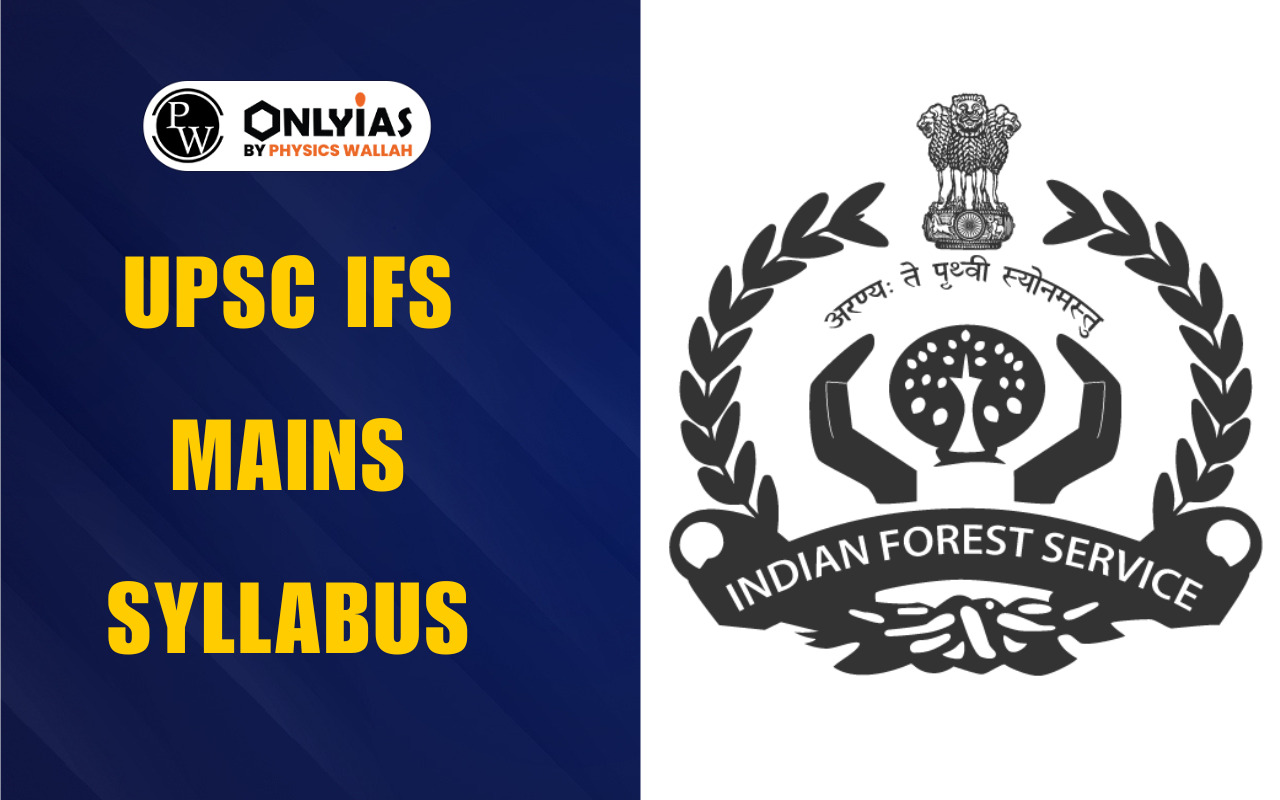UPSC IFoS Mains Syllabus 2026 PDF covers six papers – General English, General Knowledge, and four optional papers. Aspirants can check subject-wise topics and exam pattern to prepare effectively for the Indian Forest Service Mains Examination.

UPSC IFS Mains Syllabus 2026: After passing the Indian Forest Service (IFS) Prelims examination, candidates proceed to the IFS Mains examination. It’s crucial to emphasize that the IFS Mains syllabus diverges completely from the CSE Mains syllabus. The UPSC IFS Mains Syllabus 2026 exam shall consist of written/descriptive papers. The IFS Mains exam consists of six papers, with candidates tasked with choosing two optional subjects specifically for the IFS exam. These IFS optional subjects encompass two papers each, totaling four optional papers. This distinctive structure underscores the unique and specialized nature of the Indian Forest Service examination compared to the Civil Services Examination.
Enroll now for UPSC Online Course
The syllabus for the Indian Forest Service (IFS) Mains exam is vast and covers a wide range of subjects. Here’s a brief overview of the syllabus:
| UPSC IFS Syllabus 2026 – Compulsory Papers | |
| Subject | Topics |
| General English |
|
| General Knowledge |
|
In UPSC IFS Mains, the candidates will have to opt for two optional subjects from the list of 14 subjects. The UPSC IFS Optional paper will be divided into two parts, Part A and Part B. There will be eight questions in each optional subject paper with four in each part. The UPSC IFS Syllabus 2026 for optional papers is as follows:
| UPSC IFS Syllabus 2026 – Optional Subjects | |
| Subject | Topics |
| Agriculture | Paper I:
Paper II:
|
| Animal Husbandry & Veterinary Science | Paper I:
Paper II:
|
| Chemistry | Paper I:
Paper II:
|
| Agricultural Engineering | Paper I:
Paper II:
|
| Botany | Paper I:
Paper II:
|
| Civil Engineering | Paper I:
Paper II:
|
| Chemical Engineering | Paper I:
Paper II:
|
| Forestry | Paper I:
Paper II:
|
| Mathematics | Paper I:
Paper II:
|
| Mechanical Engineering | Paper I:
Paper II:
|
| Physics | Paper I:
Paper II:
|
| Zoology | Paper I:
Paper II:
|
| Statistics | Paper I:
Paper II:
|
| Geology | Paper I:
Paper II:
|
Enroll now for UPSC Online Classes
The UPSC IFoS Mains Syllabus 2026 comprises six descriptive papers: Paper I (General English, 300 marks), Paper II (General Knowledge, 300 marks), and Papers III-VI (two optional subjects, 200 marks each), totaling 1400 marks. Candidates must select two optional subjects from 14 approved options like Zoology, Botany, and Forestry, with detailed topics available in the official notification on upsc.gov.in. Download the complete IFoS Mains Syllabus PDF directly from the UPSC website’s syllabus section to plan preparation for the November 2026 exam effectively. This structured syllabus emphasizes forestry, environment, and subject-specific knowledge crucial for final merit.
Download UPSC IFS Mains Syllabus 2026 PDF
Candidates who succeed in the UPSC IFS prelims move on to the mains, which consists of 6 descriptive papers. The syllabus for this stage is crucial, as the scores determine the final merit list.
In the 2026 UPSC IFS Mains Exam Pattern,
| UPSC IFS Mains Exam Pattern 2026 | ||
| Paper | Subject | Marks |
| Paper I | General English | 300 |
| Paper II | General Knowledge | 300 |
| Paper III | Optional I | 200 |
| Paper IV | Optional II | 200 |
| Paper V | Optional III | 200 |
| Paper VI | Optional IV | 200 |
Ready to boost your UPSC 2026 preparation? Join PW’s UPSC online courses today!
Check Out UPSC CSE Books
Visit PW Store
There are a total of 14 optional subjects specified in the official notification of UPSC.
No, the first two papers of UPSC IFS mains i.e Paper I and Paper II are of 300 marks each and the four optional papers have weightage of 200 marks each.
No you can choose two optional combinations other than specified by UPSC, combination is mentioned in the above article.
Yes, in the UPSC IFS prelims, there is a negative marking of -0.66 for Paper 1 and -0.83 for Paper 2.
Yes, the syllabus for UPSC IAS and UPSC IFoS is the same for the Prelims stage. However, the Mains syllabus differs, with IFoS focusing more on science and engineering subjects while IAS covers broader topics in general studies.
Yes, Paper I (General English) tests essay writing, comprehension, précis, and grammar, carrying 300 marks and requiring answers only in English.
Yes, General English and General Knowledge papers overlap significantly with CSE, but IFoS emphasizes forestry, environment, and technical optionals.
<div class="new-fform">
</div>
